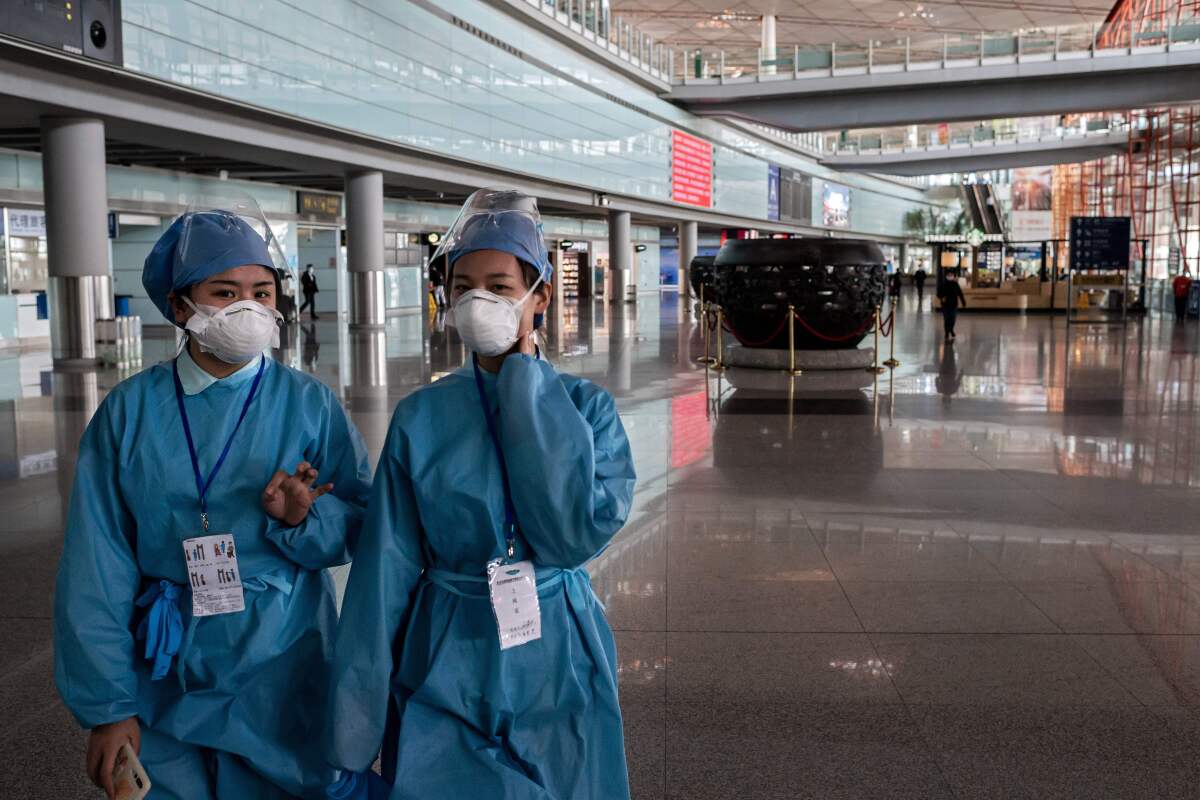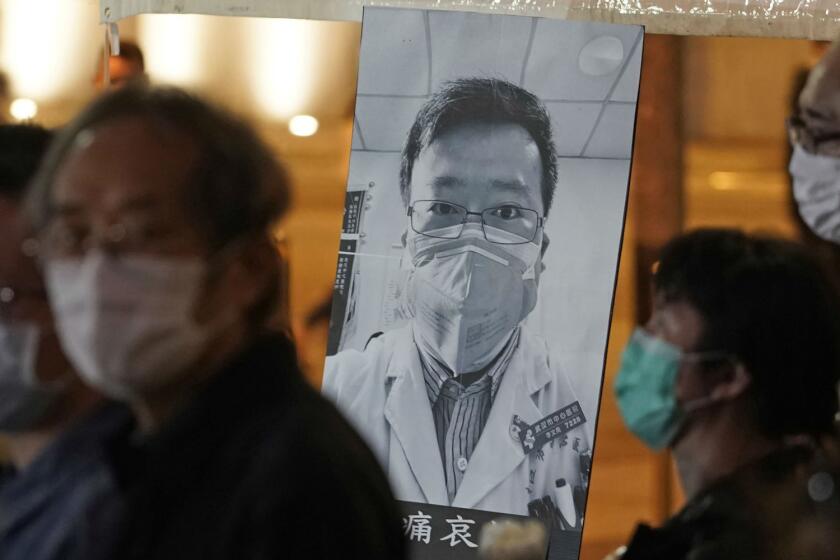Trump administration ratchets up advisory: Avoid international travel

- Share via
WASHINGTON — Issuing one of its toughest restrictions yet to slow the spread of the coronavirus, the Trump administration warned Americans on Thursday to avoid all international travel and advised U.S. citizens currently overseas to come home or prepare to remain where they are indefinitely.
And in further global disruption from the pandemic, the White House announced late Thursday that the June summit of the Group of 7 top economies, scheduled to be held at Camp David, will be scratched and replaced by videoconference. Preparations leading up to the summit had already shifted to teleconferences.
The moves came as Senate Republicans and Democrats outlined competing ideas for an expected $1-trillion stimulus package to limit the financial fallout.
Conversations were underway behind closed doors, but it remained unclear when an agreement would be reached, even as the economic damage spreads and the stock market teeters. If ultimately approved and signed by President Trump, the package would be the third emergency measure since the crisis began.
Trump had already partially closed the U.S. borders with Canada and is prepared to do so with Mexico as soon as Friday. He has also restricted entry of non-U.S. citizens flying from Europe. But the advisory issued Thursday by the State Department, believed to be the widest of its kind, could trigger the greatest disruption yet on travel by Americans.
“The Department of State advises U.S. citizens to avoid all international travel due to the global impact of COVID-19,” the agency said, issuing its highest level of warning, known as Level 4, a category usually reserved for extremely dangerous locations such as Syria or Iran.
It is not an outright prohibition and does not mention exemptions for business or essential travel. However, it presumably would absolve the State Department of some responsibility in bringing home stranded Americans who ignore the warning.
“In countries where commercial departure options remain available, U.S. citizens who live in the United States should arrange for immediate return to the United States, unless they are prepared to remain abroad for an indefinite period,” the State Department said. “U.S. citizens who live abroad should avoid all international travel.”
There are hundreds of thousands of U.S. citizens living or traveling abroad at any one time.
Sen. Robert Menendez (D-N.J.) called on the State Department to set up charter flights to transport Americans home to the United States. His and other congressional offices have been flooded with complaints from traveling U.S. citizens who say they cannot find transportation home and that U.S. embassies and consulates abroad are not helping them.
The State Department says it has been doing what it can for U.S. citizens abroad but notes many of its own services have had to shut down because of the pandemic. Its advisory says U.S. citizens overseas should “consider” returning to their country of residence immediately “using whatever commercial means are available.” It adds, “Have a travel plan that does not rely on the U.S. government for assistance.”
Those options are fast dwindling. Even before the new restrictions, the U.S. airline industry had eliminated or dramatically reduced the frequency of most international flights. Earlier this week, United Airlines announced plans to cut domestic routes by 42% and slash international routes by 85%, leaving only 45 daily flights from the U.S. to foreign destinations in the month of April. Delta Air Lines similarly announced plans to cut international service by 80% and park 600 planes.
American Airlines President Robert Isom said in a letter to employees Thursday that the airline had reduced international flying by 75% and cut its domestic schedule by 30% in April — a grounding of more than 55,000 flights — with plans to reduce it even further in May.
All of the actions come as the White House scrambles to make up for lost time and ramp up U.S. defenses against a fast-spreading virus that has infected more than 13,000 people in the United States, and killed at least 200.
In the legislative arena, Republicans have been working closely with Trump administration officials on a plan for federally backed loans for small businesses that continue paying their workers, and for direct payments to most taxpayers.
“Senate Republicans want to put cash in the hands of the American people,” said Senate Majority Leader Mitch McConnell (R-Ky.). He said the money should go out “as rapidly as possible” and would be available to “the middle class on down.”
McConnell unveiled new details of the Republican proposal, including payments of as much as $1,200 per person or $2,400 per couple. An additional $500 would be given per child. Payments would be lower for individuals making more than $75,000 or couples making more than$150,000.
However, McConnell is facing some resistance within the GOP caucus to the payments. Sen. Lindsey Graham (R-S.C.) and Sen. Richard C. Shelby (R-Ala.) told reporters they were concerned the checks would not be effective.
The package includes $208 billion in loans and loan guarantees to struggling industries, primarily airlines that have seen demand for flights plummet, as well as $300 billion in financial assistance for small businesses to help them keep paying workers.
Treasury Secretary Steven T. Mnuchin told Fox Business on Thursday morning that most Americans would receive $1,000 plus $500 for each child — $3,000 for a family of four.
“We’d get this out in three weeks,” he said. “And then, six weeks later, if the president still has a national emergency, we’d deliver another $3,000.”
McConnell differentiated between the current global health crisis and the risky credit practices that led to the 2008 financial collapse and subsequent bank bailout.
“None of these firms — not corner stores, not pizza parlors, not airlines — brought this on themselves,” he said.
Senate Minority Leader Charles E. Schumer (D-N.Y.) said he was concerned that too much money would end up in corner offices rather than workers’ pockets. He also said direct payments to Americans would likely not be enough to insulate households from the effects of the economic slowdown.
“That may help families cover rent, groceries for a month. But then what?” he said.
Schumer said the country needs “unemployment insurance on steroids,” and suggested boosting payments for those who apply for the program when they lose their jobs.
Democrats are also pushing a massive investment in public health infrastructure, a proposal that Schumer compared to the rebuilding of Europe after World War II.
“We need a Marshall Plan for our healthcare system,” he said.
The first emergency measure from Congress included $8.3 billion, with most of the money going to federal health officials for vaccine research and to state and local governments for their response efforts.
The second was signed by Trump on Wednesday. It makes most coronavirus testing free, expands paid sick leave to more American workers and boosts funding for unemployment benefits and food programs.
Sen. Kamala Harris (D-Calif.) said in an interview with The Times that she’s worried one or two payments from the government won’t be enough. “We’ve got to make sure we’re taking care of these families, and frankly rescuing them from what is a disaster on top of a pandemic,” she said.
In addition to direct financial assistance, Harris said Congress should pause credit reporting rules so missed payments don’t wreck consumers’ credit scores and make it harder for them to climb out of the current crisis. “We can’t continue with business as usual during this pandemic,” she said.
Times staff writer Hugo Martin in Los Angeles contributed to this report.
The latest updates from our reporters in California and around the world
More to Read
Get the L.A. Times Politics newsletter
Deeply reported insights into legislation, politics and policy from Sacramento, Washington and beyond. In your inbox twice per week.
You may occasionally receive promotional content from the Los Angeles Times.












